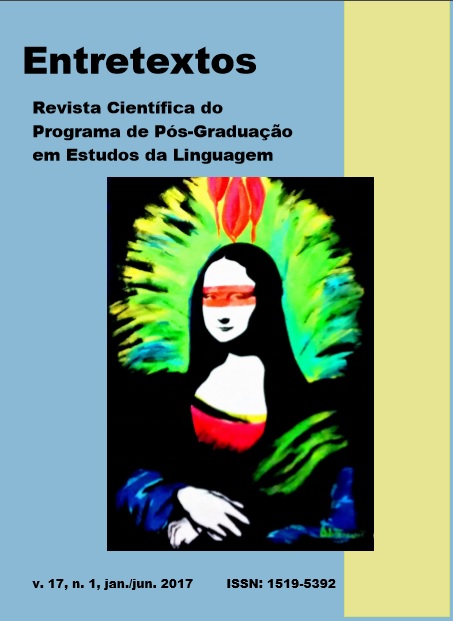Speech genres and discourses practices about non-human animals
DOI:
https://doi.org/10.5433/1519-5392.2017v17n1p301Keywords:
Language, Ideology, Scientific experimentationAbstract
We understand, according to the bakhtinian perspective, that no fact of nature has meaning in itself, but the meaning just arises through language. Thus, the analysis of language helps to understand the ideological positions that support the discourses and consequently human practices. From this, we aim to comprehend how non-human animals (usually called guinea pigs) and the practices involving them, focused on laboratory experimentation, are perceived and presented by the scientific discourse genre, as well as how such a vision contributes to structure the relations we establish with them. For this, we analyzed a scientific article, using as category of analysis the notion of speech genres. We realize, in the analyzed text, the perspective that the use of animals is essential to the progress of science, so that any activity contrary to the performance of this practice is seen as radical and harmful to the scientific development.Downloads
References
BAKHTIN, Mikhail Mikhailovich. Marxismo e Filosofia da Linguagem: problemas fundamentais do método sociológico da linguagem. Problemas fundamentais do Método Sociológico na ciência da Linguagem. Tradução Michel Lahud e Yara Frateschi Vieira. 13. ed. São Paulo: Hucitec, 2009.
BRÃœGGER, Paula. Nós e os outros animais: especismo, veganismo e educação ambiental. Linhas críticas, Brasília, v. 15, n. 29, p. 197-214, 2009.
DARWIN, Charles. A origem das espécies. São Paulo: Hemus, 2003.
DAWKINS, Richard. O gene egoísta. São Paulo: Itatiaia, 1979.
FRANCIONE, Garry Lawrence. Animals as persons: essays on the abolition of animal exploitation. New York: Columbia University Press, 2008.
FRANCIONE, Garry Lawrence. Introduction to animal rights: your child or the dog? Philadelphia: Temple University Press, 2000.
GOULD, Stephen Jay. A falsa medida do homem. São Paulo: Martins Fontes, 1991.
GUERRA, Andréa Trevas Maciel. Do holocausto nazista à nova eugenia no século XXI. Ciência & Cultura, São Paulo, v. 58, n. 1, p. 4-5, 2006.
KOTTOW, Miguel. História da ética em pesquisa com seres humanos. Revista Eletrônica de Comunicação, Informação & Inovação em Saúde, Rio de Janeiro, v. 2, p. 7-18, 2008.
MARRAS, Stelio. Ratos e homens e o efeito placebo: um reencontro da cultura no caminho da natureza. Campos, Curitiba, v. 2, p. 117-133, 2002.
MEDVIÉDEV, Pável Nikoláievitch. O método formal nos estudos literários: introdução crítica a uma poética sociológica. Tradução Sheila Camargo Grillo e Ekaterina Vólkova Américo. São Paulo: Contexto, 2012.
RAYMUNDO, Marcia Mocellin; GOLDIM, José Roberto. Ética na pesquisa em modelos animais. Revista Bioética, Brasília, v. 10, n. 1, p. 31-44, 2002.
RYDER, Richard Dudley. Speciesism, painism and happiness: a morality for the twenty-first century. Exeter: Imprint Academic, 2011.
SINGER, Peter. Ética prática. 2. ed. Tradução Jefferson L. Camargo. São Paulo: Martins Fontes, 1998.
TRINDADE, Gabriel Garmendia da. Animais como pessoas: a abordagem Abolicionista de Gary L. Francione. 2013. 219 f. Dissertação (Mestrado em Filosofia) - Universidade Federal de Santa Maria, Santa Maria, 2013.
Downloads
Published
How to Cite
Issue
Section
License
Copyright (c) 2017 Entretextos

This work is licensed under a Creative Commons Attribution 4.0 International License.
Entretextos adota a Licença Creative Commons Attribution 4.0 International, portanto, os direitos autorais relativos aos artigos publicados são do/s autor/es.
Sob essa licença é possível: Compartilhar - copiar e redistribuir o material em qualquer suporte ou formato. Adaptar - remixar, transformar, e criar a partir do material, atribuindo o devido crédito e prover um link para a licença e indicar se mudanças foram feitas.























